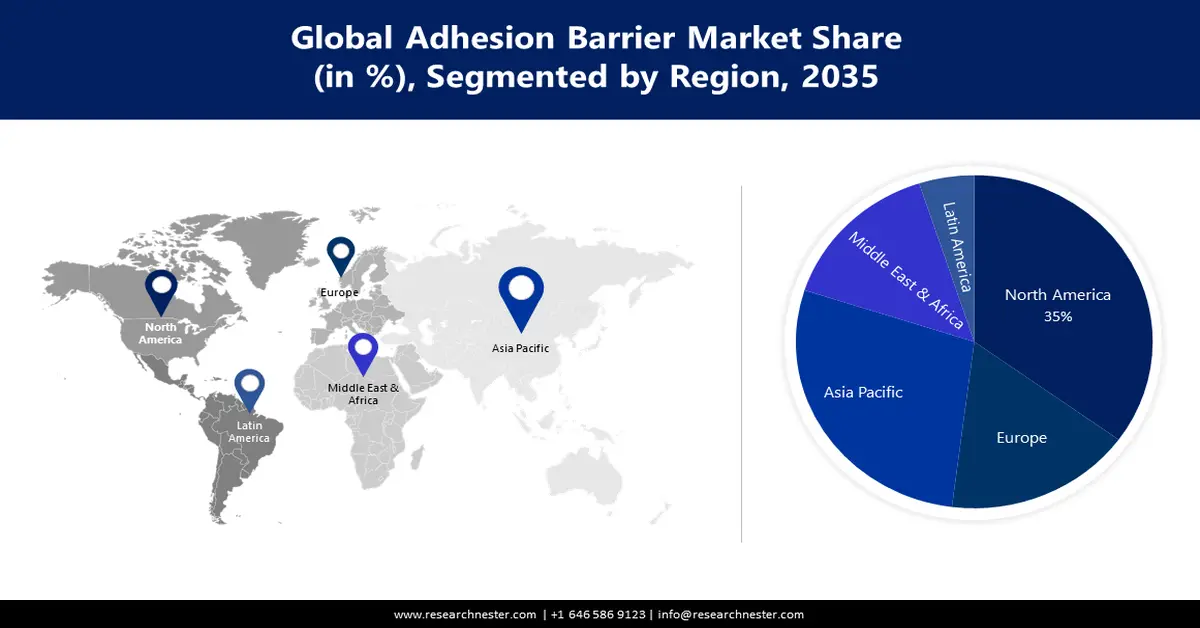Adhesion Barrier Market Outlook:
Adhesion Barrier Market size was over USD 930.46 million in 2025 and is anticipated to cross USD 1.86 billion by 2035, witnessing more than 7.2% CAGR during the forecast period i.e., between 2026-2035. In the year 2026, the industry size of adhesion barrier is assessed at USD 990.75 million.

The reason behind the growth is due to the growing number of surgical procedures. Adhesion barriers have been shown to improve good surgical technique by minimizing post-operative adhesions as they facilitate the physical separation of tissues or organs during the recovery period following surgery. Moreover, adhesion development is a significant post-operative complication that affects patients and necessitates additional procedures for treatment necessitating the use of adhesion barriers to lower the chance of problems following surgery. Every year, more than 309 million major surgical procedures are carried out worldwide.
The growing technological advancements are believed to fuel the adhesion barrier market growth. More and more cutting-edge solutions such as the creation of sheet- and spray-type adhesion barriers are being introduced as a result of ongoing research and development activities, giving more efficacy and fewer adverse effects.
Key Adhesion Barrier Market Insights Summary:
Regional Highlights:
- The North America adhesion barrier market will hold over 36% share by 2035, driven by rising healthcare spending and demand for advanced medical technologies.
- The Asia Pacific market will secure the second largest share by 2035, attributed to rising population increasing demand for medical treatments.
Segment Insights:
- The film/mesh segment in the adhesion barrier market is expected to achieve a 35% share by 2035, driven by the increasing number of surgical procedures and use as post-op barriers.
- The synthetic adhesion barriers segment in the adhesion barrier market is expected to achieve a notable revenue share by 2035, driven by their cost-effectiveness and efficiency in surgical use.
Key Growth Trends:
- Rising Cases of Chronic Disorders
- Growing Elderly Population
Major Challenges:
- Hesitation among Medical Professionals to Use Adhesion Barriers
- Stringent Regulatory Requirements for Obtaining Product Approvals
Key Players: Becton Dickinson and Company, Baxter International, Inc., Johnson & Johnson, Anika Therapeutic, Inc., FzioMed, Inc., Mast Biosurgery, Inc., Innocoll Holdings PLC, Atrium Medical Corporation.
Global Adhesion Barrier Market Forecast and Regional Outlook:
Market Size & Growth Projections:
- 2025 Market Size: USD 930.46 million
- 2026 Market Size: USD 990.75 million
- Projected Market Size: USD 1.86 billion by 2035
- Growth Forecasts: 7.2% CAGR (2026-2035)
Key Regional Dynamics:
- Largest Region: North America (36% Share by 2035)
- Fastest Growing Region: Asia Pacific
- Dominating Countries: United States, China, Japan, Germany, United Kingdom
- Emerging Countries: China, India, Japan, South Korea, Singapore
Last updated on : 10 September, 2025
Adhesion Barrier Market Growth Drivers and Challenges:
Growth Drivers
-
Rising Cases of Chronic Disorders – This may lead to a rise in several surgeries which may increase the demand for adhesion barriers a medical device that can be used to lessen internal adhesions. According to the World Health Organization (WHO), Noncommunicable diseases (NCDs) account for 41 million annual fatalities, or 74% of all fatalities worldwide.
-
Growing Elderly Population- The elderly population is more prone to osteoarthritis, arthritis, and fractures which may necessitate surgeries including joint replacements, leading to higher demand for adhesion barriers. According to estimates, over 9% of the world's population, or roughly 770 million individuals were over the age of 65 in 2022.
- Spiking Cases of Road Accidents- As a result, there may be a rising number of traumatic surgeries which would lead to higher demand for adhesion barriers as it can help to prevent the risk of adhesion formation and help in wound care. For instance, road traffic accidents are currently the seventh most common cause of mortality worldwide as each year, they result in over 45 million injuries and more than 1 million fatalities.
- Rising Incidence of Infertility- Adhesion barrier gel is often used after hysteroscopy for infertility treatment to reduce postoperative adhesion reformation.
Challenges
-
Hesitation among Medical Professionals to Use Adhesion Barriers – Adhesive barrier products are quite expensive there many health professionals in developing regions with limited resources hesitate to use them. Besides this, there are no standard guidelines for the use of these barriers which may limit their adoption among healthcare professionals.
-
Stringent Regulatory Requirements for Obtaining Product Approvals
- Limited Awareness and Education among Healthcare Professionals and Patients.
Adhesion Barrier Market Size and Forecast:
| Report Attribute | Details |
|---|---|
|
Base Year |
2025 |
|
Forecast Period |
2026-2035 |
|
CAGR |
7.2% |
|
Base Year Market Size (2025) |
USD 930.46 million |
|
Forecast Year Market Size (2035) |
USD 1.86 billion |
|
Regional Scope |
|
Adhesion Barrier Market Segmentation:
Formulation Segment Analysis
The film/mesh segment in the adhesion barrier market is estimated to gain a robust revenue share of 35% in the coming years owing to the rising surgical procedures. The most prevalent kind of adhesion barrier, film formulations are constructed of a thin, flexible material that is positioned in between the organs and tissues during surgery and can be implanted in a patient by themselves as anti-adhesive barriers to prevent adhesions after surgery. According to estimates, in 2021, non-surgical operations rose by over 40% while surgical procedures rose by more than 50%.
Additionally, the gel segment is poised to garner significant market share during the forecast timeframe. Adhesion barrier gel serves as a barrier to stop or lessen post-surgical adhesions since it is sterile, clear, and highly viscous preventing fibroblast migration. It improves patient rehabilitation and is often used by gynecologists after surgical hysteroscopy in infertile women to reduce the creation of new adhesions.
Product Segment Analysis
Adhesion barrier market from the synthetic adhesion barriers segment is set to garner a notable share shortly. Synthetic adhesion barriers have become more and more popular in a variety of surgical procedures, including abdominal, gynecological, and cardiovascular surgeries as they are naturally able to contain a sizable amount of moisture, and are more efficient and safe for use in manufacturing. Moreover, synthetic adhesion barriers are more cost-effective and commercially available. Besides this, the natural adhesion barriers segment is anticipated to garner a significant share by the year 2035. Natural adhesion barriers are biologically sourced and they appear to sustain more potent anti-adhesion effects on oozing surfaces.
Application Segment Analysis
The cardiovascular surgeries segment in the adhesion barrier market is estimated to gain a robust revenue share in the coming years. Since more than 40 years ago, adhesion barriers have been employed in cardiac surgery as they frequently result in postoperative intrapericardial adhesion, which raises the danger of consequences such as organ damage, and hemorrhage. Moreover, adhesions around the heart may make a second cardiac surgery more difficult therefore, in cases where a future reoperation is expected, the use of an adhesion barrier is advised.
Furthermore, the gynecological surgeries segment in the adhesion barrier market is expected to witness substantial growth during the forecast timeframe. After gynecological operations, a variety of anti-adhesive barriers can be applied as adhesion formation during gynecologic procedures is common and extremely problematic since it immediately causes difficulties and makes subsequent surgery more challenging.
Our in-depth analysis of the global adhesion barrier market includes the following segments:
|
Product |
|
|
Formulation |
|
|
Application |
|
|
End-User |
|

Vishnu Nair
Head - Global Business DevelopmentCustomize this report to your requirements — connect with our consultant for personalized insights and options.
Adhesion Barrier Market Regional Analysis:
North American Market Insights
Adhesion barrier market in North America is predicted to account for the largest share of 36% by 2035 impelled by the rising spending in healthcare. More than everywhere else in the world, healthcare spending is soaring in the US as both private and public payer payments have increased, and the majority of the United States healthcare providers are private. As a result, there is an increasing focus on advanced medical technologies to prevent post-surgical complications which may create a huge demand for adhesion barriers in the region. According to estimates, in 2021, the United States spent more than 2% more on health care, amounting to around USD 4 trillion or roughly USD 12,910 per person.
APAC Market Insights
The APAC adhesion barrier market is estimated to be the second largest, during the forecast timeframe led by a rising population. For instance, more than 50% of the world's population resides in the Asia Pacific region. Moreover, with more than 1 billion inhabitants, India will continue to be the most populous nation through the end of the century, followed by China with over 760 million people. This is expected to increase the number of people requiring medical treatments, leading to higher demand for adhesion barriers in the region.
European Market Insights
The adhesion barrier market in Europe is poised to hold a significant share by the end of 2035 driven by increasing health awareness. Europe has introduced several innovative and successful strategies to encourage good health and well-being through funding and legislation on a variety of subjects, including food, diseases, clean air, and more. As a result, people in the region are focusing more on post-surgical care which is expected to increase the demand for adhesion barriers.

Adhesion Barrier Market Players:
- Sanofi S.A.
- Company Overview
- Business Strategy
- Key Product Offerings
- Financial Performance
- Key Performance Indicators
- Risk Analysis
- Recent Development
- Regional Presence
- SWOT Analysis
- Becton Dickinson and Company
- Baxter International, Inc.
- Johnson & Johnson
- Anika Therapeutic, Inc.
- FzioMed, Inc,
- Mast Biosurgery, Inc.,
- Innocoll Holdings PLC
- Chemence Medical, Inc.
- Atrium Medical Corporation
Recent Developments
- Baxter International, Inc. acquired a Seprafilm Adhesion Barrier that greatly lowers the frequency, severity, and length of adhesions after abdominal and pelvic surgery from Sanofi to reduce the severity of adhesions in various pelvic and abdominal procedures and to guarantee a smooth transition by collaborating with consumers and distributors.
- Baxter International, Inc. announced to acquisition of PerClot Polysaccharide Hemostatic System from CryoLife, Inc. to provide patients with the best possible treatment by addressing a variety of intraoperative bleeding and assisting surgeons in using the appropriate products for the hemorrhage.
- Report ID: 4535
- Published Date: Sep 10, 2025
- Report Format: PDF, PPT
- Explore a preview of key market trends and insights
- Review sample data tables and segment breakdowns
- Experience the quality of our visual data representations
- Evaluate our report structure and research methodology
- Get a glimpse of competitive landscape analysis
- Understand how regional forecasts are presented
- Assess the depth of company profiling and benchmarking
- Preview how actionable insights can support your strategy
Explore real data and analysis
Frequently Asked Questions (FAQ)
Adhesion Barrier Market Report Scope
Free Sample includes current and historical market size, growth trends, regional charts & tables, company profiles, segment-wise forecasts, and more.
Connect with our Expert
Copyright @ 2026 Research Nester. All Rights Reserved.




